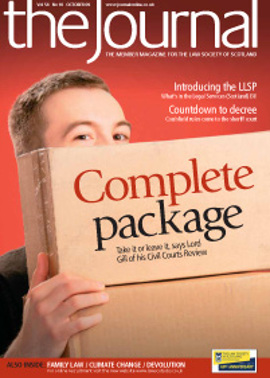At the hub, 10 years on

It was not your ordinary Law Society of Scotland conference. A former First Minister, and Deputy; one current Cabinet Secretary; another former party leader; the chair of a commission on the constitution; and at least two more ex-ministers. That was just part of the speaker list, which also featured well known names from business and the professions; other kent faces could be spotted among the delegates.
But this was not the Society suddenly playing politics ahead of the party conference season. No, it was the pull of its special conference to mark 10 years of the devolution settlement that saw such an impressive lineup from a group of people that the Society in times past usually kept at arm’s length.
The motive, as President Ian Smart said in opening the proceedings, was to deepen the Society’s engagement with civic Scotland, that phrase that has come into vogue over the past decade and which appears to embrace pretty well anyone who makes things happen in public life (or wants to). The Society maybe didn’t adapt quickly enough at the outset, he added, but it is now fully committed to playing its part.
And it is doing so with some energy. Of course, its own nature is set to change quite fundamentally as it prepares to equip itself to function as a regulator of legal services providers rather than simply individual solicitors. It has also found itself playing an increasingly pivotal role both with Government, through detailed discussions on the content of a number of important bills and regulations, and with the Scottish Parliament, where it is easily the most significant source of evidence to committees examining individual bills as they make their parliamentary journey.
Against that background it is not so surprising that the Society should have seen it as part of its function to stage this event, set in the well-appointed environs of the John McIntyre Centre at Edinburgh University’s Pollock Halls (no, not just student residence facilities). Nor indeed that it should have secured such impressive support from that civic constituency with which the Society is now on better terms.
Positives, and challenges
To give them their due, the politicians by and large, while certainly not concealing their allegiances, gave fairly candid assessments of what had and had not worked, of past achievements and future challenges. Keynote speaker and former First Minister Jack McConnell set the tone with a sparkling address. For him there had been four big positives. First, public sector reforms, including those to the justice system, which had been of a type far more appropriate to Scotland than anything that might have been copied from elsewhere. Secondly, “consistency” – something not predicted, but consistency of policy had made a “huge difference” to the economy and to attracting inward investment. Thirdly, leadership – the office of First Minister attracted far more weight and status than a Secretary of State ever could, whether in dealing with other countries or with domestic issues, such as the summit on sectarianism. And fourthly, innovation, where for example a different visa policy had been achieved from the rest of the UK in order to address Scotland’s skill shortage – something quite inconceivable prior to devolution. Or the smoking ban, “the single most significant piece of legislation passed by the Parliament”. But supposing a Westminster Government had decided to use Scotland as a guinea pig for such legislation? It worked, he said, because we felt we had done it for ourselves.
For the future, he continued, the next 10 years would clearly be unpredictable, but there needed to be political debate in five areas. In line with speakers in at least one breakout session, he argued that the current structure of 32 local authorities is “unsustainable”. Next, Scotland has not yet developed the wider policy community that supports development, comparable to bodies such as the Institute for Public Policy Research. Few reports in his time had “challenged him to sit down and think”, and there was a role for bodies such as the Society here.
Parliamentary reform, he continued, was another area where the balance between members and ministers is not yet right, with not enough holding to account. The fourth area was economic powers, where we need more financial responsibility, though he was not wholly convinced of the Calman proposals. Finally there was the relationship with the UK Government. Again other speakers also deprecated the lack of arrangements for members of one Parliament wishing to visit the other, something which, McConnell said, was bound to foster a lack of respect and which was far removed from what he had witnessed in other countries. There had, he added, to be a more mature relationship with Westminster because of the international implications of issues like the Al-Megrahi release to Libya.
Still to do
The panel session after lunch brought some more perspectives. Former Conservative leader, and solicitor, David McLetchie claimed that the Parliament had got off to a bad start with issues such as foxhunting and the cost of the new building, but had learned a lot and the challenge now was to build on its experience to good effect. He cautioned that there is still a degree of resentment in England where people think of the Scots as getting a better deal, while Scots still seem to expect the UK Government to get them out of difficulties. While the current settlement is “not the finished article”, it is important to achieve a degree of finality and stability, or we are playing into the nationalists’ hands.
Former minister Susan Deacon, now Professor of Social Change at Queen Margaret University, offering an “unfettered personal opinion”, argued that we have the balance fundamentally wrong between talking about structures and talking about how to make Scotland better. If, in Hume’s words, the truth arises through disagreement among friends, “we aren’t anywhere near this”. There has been no “first principles debate” about how the health system is funded, about the education system, about the tax powers that people voted for, and pressure groups often demand more legislation as a proxy for dealing with other challenges.
In an interesting answer Ms Deacon also suggested that too many special interest groups are “sitting in sectoral silos”, tending to blame others for their problems. “If you want to be effective in lobbying, you need to understand the interests of others involved”, she added.
The Liberal Democrat voice was former leader and Deputy First Minister Lord (Jim) Wallace of Tankerness. One of a number of speakers who emphasised that people feel much closer to their politicians than under the Westminster system, he said it was too much to expect that devolution was going to be “All that we hoped for?” – the title of the session – but supported Donald Dewar’s description of the Parliament as “a new voice in the land”. Upholding the committee system, the opportunity for public petitions and the use of IT in the Parliament compared with Westminster, he praised the freedom of information and the DNA retention laws as instances where Scotland had achieved a better result.
Views from outside
Not that the day was entirely given over to politicians, by any means. Sir Kenneth Calman himself was there to assure us that his commission was proposing a positive way forward and not just a common-denominator compromise. A panel including the Society’s Michael Clancy, former Lord Advocate Lord Boyd and Christine O’Neill of Brodies debated devolution as the key to a modern legal system – still room for improvement, it appears. Douglas Nisbet, President of ICAS, and John Anderson of Entrepreneurial Exchange tackled the issue of whether it is an economic driver or just another layer of bureaucracy – the former for the ability to engage with ministers and MSPs; the latter for the number of different authorities to be dealt with, was a main theme. Graham Blount of Citizens Advice Scotland and Martyn Evans, who is now leaving Consumer Focus Scotland, took the subject of engagement with the public and agreed that great strides have been made, in parallel with a sea change in social attitudes to for example public sector tenants or the homeless.
And there was more; it just wasn’t possible to go to everything.
And next?
The day was not complete, of course, without hearing from the present Government, represented by Mike Russell. While recognising what the Parliament had achieved, he argued that it was fundamentally constrained by the limits of the present settlement, and we had no mechanism such as in Spain where a five-yearly review is built in. But was there a sting in the tail when he trailed the promised Referendum Bill as offering the right of people to choose under which system of government they live, while maintaining that there was no need to put the results of any negotiations with London to a further vote?
In this issue
- The Combined Standard Clauses (2009 edition)
- Preserving a legal inheritance: settlement rights in the "Occupied Palestinian Territories"
- The European Court and the duty to investigate deaths
- Chief Executive's SGM address
- Shelter's online resources
- Musical copyright and contract
- The international swap shop
- Headline fortnight
- The Gill Report? What's not to like?
- Solicitor advocates and conflicts of interest
- Settlement in the West Bank
- Package deal
- RoS = economic value
- Defining the future
- Global leader?
- Dog's chance
- Coulsfield rules OK
- Money and your life
- Experts on the case
- At the hub, 10 years on
- Guardians: don't look to the Fund
- From the Brussels office
- Ask Ash
- Making the most of ABS
- Planning for growth
- The perils of posting
- ARTL: friend or foe?
- Where privacy prevails
- How was it for you?
- Agreeing rescues with creditors
- Adopting new solutions
- Divorce for gender change
- Scottish Solicitors' Discipline Tribunal
- Book reviews
- Website review
- A safe pair of hands tops the bill
- Law out of step






